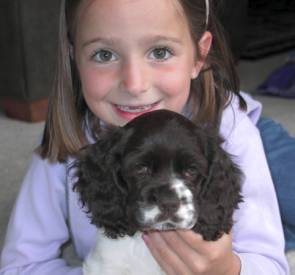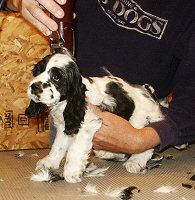Tips on buying a
Cocker Spaniel puppy
Some things I've learned about how to
locate and buy a good Cocker pup

Tips on buying a
|

|

Ask if the breeder had health tests performed on the parents to be sure they are free of genetic defects. Asking this one simple question is like a litmus test: how they answer will tell you an awful lot about whether this is a "good breeder" or a "bad breeder". The best breeders will have had both parents certified by the Orthopedic Foundation For Animals to be free of genetic hip defects and by the Canine Eye Registry Foundation to be free of genetic eye defects. Commercial breeders, backyard breeders, and puppy mills... most of whom are just trying to make money off of their dogs... will never go to the trouble or the expense of having these tests done.
Spend as much time checking out the parents as you do the puppy. Observing the parents is your most accurate way to gauge what the puppy will be like as an adult. If the breeder won't let you meet the parents, it's a big red flag that something funny might be going on. The only exception to that rule is that it is extremely common for breeder's to use a stud belonging to someone else... so it is often impossible to meet the father.
Only buy a puppy that you can pick up directly from the breeder... don't buy from a breeder willing to ship the puppy to you. Being separated from mom for the first time is traumatic enough for a puppy... but to spend the first day away from mom in the cargo hold of a jetliner is cruel beyond belief. Imagine yourself a two year old child, taken from your mother for the first time, placed in a cage and put in to the cargo hold -- not the passenger compartment -- of an airliner. Do you think they have heating and air conditioning (or even lights?) in there for the luggage? Read some horror stories here. Be extremely wary of any breeder willing to ship a young puppy to you... this would certainly tell me that the breeder was not truly concerned for the welfare of the dog. Any breeder that can't find local buyers for their puppies and has to resort to shipping puppies by air is breeding way too many puppies.
You can locate Cocker breeders near you by checking the breeder listings at The Open Directory Project and at The American Spaniel Club web sites.
 Buy a puppy raised in a family environment. Visit the breeder and get a feel for whether the puppies are
a business commodity or cherished and spoiled. Puppies that have grown up in a family environment are
much more likely to be properly socialized than puppies who have not received much attention from humans.
A dog that has not been properly socialized will be much less loving and may especially have trouble
dealing with children. This is all too common in dogs bought from pet stores or high-volume breeders
where the dogs are kept in cages and do not receive frequent human interaction.
Buy a puppy raised in a family environment. Visit the breeder and get a feel for whether the puppies are
a business commodity or cherished and spoiled. Puppies that have grown up in a family environment are
much more likely to be properly socialized than puppies who have not received much attention from humans.
A dog that has not been properly socialized will be much less loving and may especially have trouble
dealing with children. This is all too common in dogs bought from pet stores or high-volume breeders
where the dogs are kept in cages and do not receive frequent human interaction.
Never buy a puppy from a pet store, no matter where the pet store says the puppy came from. No reputable breeder would ever sell puppies to a pet store. Pet store puppies never come from parents who have been tested for hereditary defects such as hip and eye problems. Most pet store puppies come from puppy mills... where huge numbers of adult dogs are kept in small cages and treated as livestock. Puppy mills are the only source that can supply pet stores with the constant stream of puppies that they require. If you ever saw the conditions that puppy mill dogs are kept in, you'd be ashamed. Paying good money for a puppy at a pet store only keeps puppy mills in business. Pet store puppies are not properly socialized. For a healthy, merry Cocker Spaniel puppy that will grow up to be a great pet... a pet store is the worst place you could look!
Ask to see the pedigree of any puppy you are considering purchasing. Look at the pedigree carefully, and see if you see names that appear more than once on the pedigree... this will be a sign of inbreeding or line breeding. Beware of dogs whose pedigree shows animals that have been bred to relatives. One of the reasons that the Cocker Spaniel breed has as many health problems as it does today is because of all the inbreeding that has happened in the past. My advice is to not buy any puppy whose pedigree shows dogs that were bred to their relatives... unless it's extremely distant relatives many generations apart.
Buy an 8-10 week old puppy. Don't buy a puppy younger than 8 weeks of age, no matter what the breeder tells you. 5-6 week old puppies may very well be eating plenty of solid food, but this alone does not mean they are ready to be on their own. There is a difference between when a puppy is physically able to leave its mom, and when it is emotionally able to. Be extremely wary of any breeder willing to sell a pup less than 8 weeks old... this is usually a good indication that the breeder is more interested in quick turnover than in the welfare of the puppy. It also is common in inexperienced breeders.
Just as important as not buying a dog that is too young... be careful about puppies that are too old. There are extremely important things going on in the pup's mental development from 2 - 4 months of age. This is when it is critical for a dog to bond with people.
Because it's difficult to tell if a dog is truly a show prospect until it has reached at least four months of age, some show breeders keep their puppies for quite a while so that they can evaluate whether they are show quality or not. The ones that aren't show quality are sold to people looking for pets. If the dog has been kept in a cage for the majority of that time (to protect his show coat) he might not have gotten properly socialized and might not make the best pet. If you go to visit the breeder and there are cages everywhere, beware. What you would rather see is dogs on the ground, at people's feet, being a part of the family.
There was a really interesting episode of the Oprah Winfrey show where Oprah had a dog expert on to discuss the problems Oprah has been having with her black Cocker Spaniel, Sophie. I remember reading about Oprah's Cocker... she got it from a very well respected show breeder. To make a long story short, the dog expert concluded that Oprah made one fatal mistake. She got the dog at six months of age and it did not get properly socialized. I know we experienced the same kind of problems with a dog we acquired from a show breeder at 6 months of age. That dog had lived the first six months of his life in a cage, and was scared of everyone and everything. He was a great looking dog with a great pedigree, but he never did bond with us and we never used him in our breeding program because of it.
 Think about whether this really is the right time for you to buy a puppy. Do you have an enclosed
yard for the dog to play in? Is someone home enough of the time that the dog will receive attention every
day? Are your kids old enough to treat a delicate young puppy right, even if you are not there to protect
the pup? My experience has been that children under the age of 5 simply can not understand how
gentle they must be with a young puppy. Kids of that age can also easily get knocked down by an
exuberant 6 month old Cocker. They may even unintentionally provoke the dog, which can result in
being growled at or even bitten by even the nicest and most friendly Cocker.
Think about whether this really is the right time for you to buy a puppy. Do you have an enclosed
yard for the dog to play in? Is someone home enough of the time that the dog will receive attention every
day? Are your kids old enough to treat a delicate young puppy right, even if you are not there to protect
the pup? My experience has been that children under the age of 5 simply can not understand how
gentle they must be with a young puppy. Kids of that age can also easily get knocked down by an
exuberant 6 month old Cocker. They may even unintentionally provoke the dog, which can result in
being growled at or even bitten by even the nicest and most friendly Cocker.
If you have young kids, or live in an apartment, or spend way too much time at work these days... think about waiting on your dream of owning a Cocker for a little while until the time is really right. Your life will progress and the right time will come.
Beware of breeders that will not allow you to look around their kennels. Some breeders won't ever let you see where the dogs are kept. If the breeder brings a puppy out to you, but won't let you see where the rest of the dogs are... this is a red flag. They may have something to hide... such as dogs being kept in dirty or cramped conditions. Some breeders go so far as to offer to meet you in a neutral location away from their home so that you never see the conditions the dogs are kept in. Beware!
In the United States, ask the breeder if the puppies are registered with the American Kennel Club. In Canada, it should be the Canadian Kennel Club. It's usually a red flag if the breeder has registered the puppies with a different organization, or has not registered them at all. Puppy mills and other bad breeders who have been banned from the American Kennel Club will sometimes register their dogs with other kennel clubs in an attempt to look legitimate. Be VERY skeptical. Another red flag to look for: if they accept credit cards for purchasing puppies! This usually tells you that making money off their dogs is the main reason they are breeding puppies.
 Make sure that you realize what you are getting yourself in to: The Cocker is a long-haired breed whose coat
will require a lot of care. You're going to need to brush your Cocker and give him a bath on a regular basis.
You're going to need to either purchase electric clippers and give your Cocker a hair cut at least every other month, or
pay someone to do this for you. If this is a problem for you, I've got two little words for you: Basset
Hound!
Make sure that you realize what you are getting yourself in to: The Cocker is a long-haired breed whose coat
will require a lot of care. You're going to need to brush your Cocker and give him a bath on a regular basis.
You're going to need to either purchase electric clippers and give your Cocker a hair cut at least every other month, or
pay someone to do this for you. If this is a problem for you, I've got two little words for you: Basset
Hound!
Cockers are also prone to ear infections, due to the fact that they have a big
furry ear that hangs down over the ear canal and blocks air from circulating
inside. You need to be willing to do the weekly ear cleaning if necessary.
Also, are you financially prepared for all of this? The initial purchase
price is just the beginning. Are you prepared for the cost of spaying or
neutering your dog? What about if the dog gets a cherry eye and you have
to come up with $300 or so for surgery to repair it? Don't forget the cost
of immunizations, food, flea control products, grooming services or grooming
equipment, and it goes on and on!
Don't get too worried if the puppy you are interested in seems to be "a chewer". You are only kidding yourself if you think you can find a puppy that doesn't chew things. ALL puppies chew things!
Now I'd like to share a couple of questions (and my answers) from people who had some concerns about getting a Cocker puppy...
 Hi, I just visited your site and I was wondering if you could answer a
couple of questions for me concerning cockers. I had a wonderful, sweet
cocker as a child and I was thinking of getting another one for my girls
(ages 6 & 2). Unfortunately, the one cocker that I know of now is not of
the best nature. Is this the exception to the rule? Can I count on good
blood lines to affect a puppy's temperament? Or, is it mostly in just how
the puppy is reared?
Hi, I just visited your site and I was wondering if you could answer a
couple of questions for me concerning cockers. I had a wonderful, sweet
cocker as a child and I was thinking of getting another one for my girls
(ages 6 & 2). Unfortunately, the one cocker that I know of now is not of
the best nature. Is this the exception to the rule? Can I count on good
blood lines to affect a puppy's temperament? Or, is it mostly in just how
the puppy is reared?

 I've had two Cockers in the past, and
both had some significant health problems. I want to get another Cocker puppy, but I want to make sure he comes
from a healthy background. Any suggestions?
I've had two Cockers in the past, and
both had some significant health problems. I want to get another Cocker puppy, but I want to make sure he comes
from a healthy background. Any suggestions?

I think it definitely is possible to get a good quality and healthy Cocker these days… you just have to be careful about a few things. First off, and this probably goes without saying, you can't get one at a pet store… almost all those pups come from puppy mills, and it would be hard to find a much worse source for a puppy. You definitely have to deal direct with breeders, and spend some time asking them some questions to figure out if they are just cranking out puppies for the money or if they are truly putting an effort in to breeding high quality dogs.
The first thing to ask about is health testing on both parents. The good breeders will do OFA testing of the hips and CERF testing of the eyes of both parents to screen for genetic health problems. Just asking breeders if they do OFA and CERF testing is a great litmus test for breeders… if they say they don't do OFA and CERF tests (or if they don't even know what you are talking about) you know not to waste much more time with them and to move on to a different breeder. Generally, the breeders that go to the trouble and expense of doing OFA and CERF tests are also doing a whole host of other things right. They truly "get it" when it comes to breeding healthy puppies.
The other important thing to check on is the pedigree of each of the parents. It is unfortunate that some breeders (most often breeders in the show world) have bought in to this crazy idea called "linebreeding"… where you breed dogs that share a common relative, usually a successful show dog, in hopes of getting puppies with characteristics similar to the common relative. I think it's a great way to make puppies that look like a champion show dog, but I think it's a terrible idea if you are trying to make dogs that will be healthy for 14 or 15 years. In my opinion, genetic diversity is the way to go… breeding completely unrelated dogs. So, I recommend that you look at the pedigrees of the parents of any pup you are considering adopting… and making sure that there aren't any names that appear on both pedigrees.
I think if you follow that advice, you will be way far ahead of the
game and you will have vastly improved your odds of getting a dog that will live a long healthy life.
What else have I learned as a breeder of Cocker puppies?
Read my tips on raising a Cocker puppy and my
tips on potty training a Cocker puppy. You'll
also find some useful information in my list of frequently
asked questions.
There is a LOT more to this web site than just this page!
Please explore the rest of the site by viewing our table of contents,
or by clicking on one of the quick links below.
All About Our Cockers Meet Jim Zim Contact Jim Zim